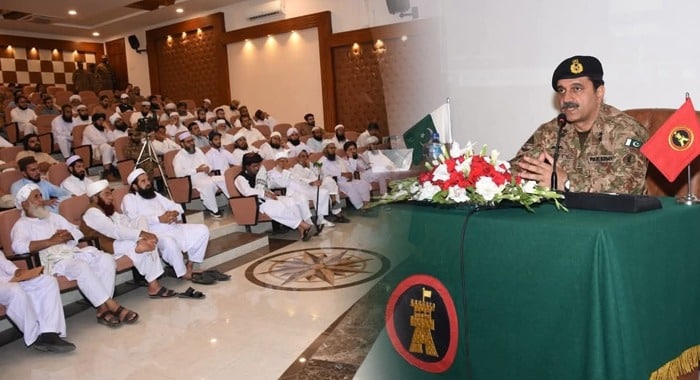In a powerful declaration against extremism, a grand Ulema Convention was held at Javed Sultan Auditorium under the theme “Why Terrorism is Forbidden in Islam,” organized under the supervision of the Pakistan Army’s 9th Division. The convention brought together over a hundred prominent religious scholars from Kohat, Hangu, Karak, and Kurram, alongside faculty and students from Kohat University. Simultaneously, nearly 500 participants from Thall, Sadda, Tari Mangal, Alizai, Pewar Tangi, and surrounding areas joined the event virtually. The 73 and 117 Brigades, Kurram Militia, and Thall Scouts played a vital role in facilitating the online sessions.
Chairman of the Council of Islamic Ideology, Allama Dr. Mufti Raghib Hussain Naeemi, served as the chief guest and delivered a keynote address that firmly condemned terrorism as the “fitna of the Khawarij.” He made it clear that no individual or group has the right, under Islamic law, to raise arms against the state, its armed forces, or its security institutions. He warned that terrorism, suicide bombings, anarchy, and violence against innocent people are fundamentally antithetical to Islamic teachings.
Allama Naeemi also underscored the significance of Paigham-e-Pakistan, a landmark declaration unanimously endorsed by thousands of scholars across all schools of thought, which rejects terrorism and extremism in all forms. He reaffirmed that Islam is a religion of peace, compassion, and coexistence, and any ideology promoting hatred and violence is in direct contradiction to its core values.
The convention culminated with an address by Major General Zulfiqar Ali Bhatti, General Officer Commanding (GOC) 9th Division, who expressed deep gratitude for the nation’s success in Operation Radd-ul-Fasaad, which achieved decisive results within just 72 hours. He commended the unwavering support and prayers of religious leaders, seminaries, and the wider community.
Major General Bhatti emphasized that the integrity and prosperity of Pakistan must remain the highest priority and called for national unity in the face of internal and external threats. Drawing parallels with the turmoil in Syria, Iraq, and Yemen, he urged the nation to be thankful for peace and stability. He called upon religious scholars to take a proactive role in countering extremist ideologies, rejecting foreign-sponsored narratives, and fostering trust and cooperation between the people and the state.
The convention marked a significant step forward in reinforcing the religious and national consensus against terrorism and in promoting a unified vision for peace, stability, and religious harmony in Pakistan.





